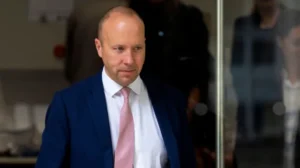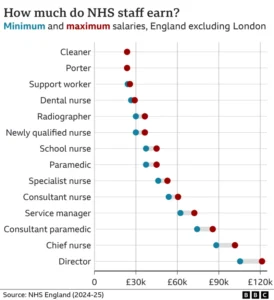Patients from Nottingham killer’s NHS trust carried out stabbings weeks before attack
Two men under the care of the same NHS trust as Valdo Calocane carried out stabbings weeks before the Nottingham attacks.
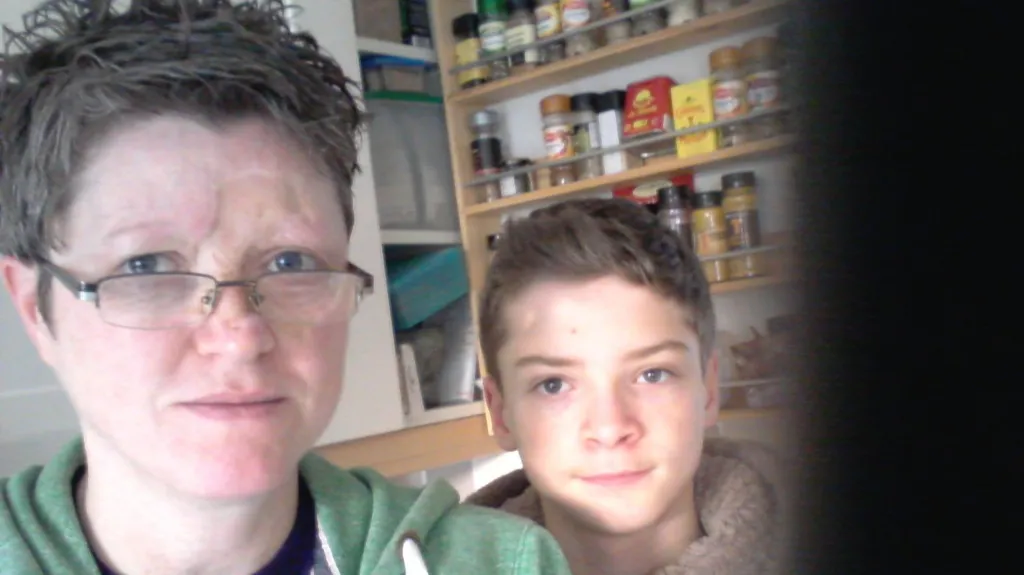
BBC News, Nottingham
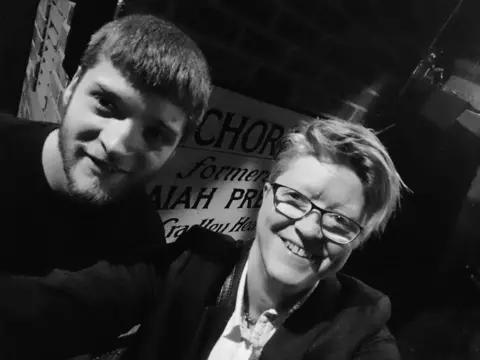 Family handout
Family handoutTwo men with paranoid schizophrenia stabbed members of the public in separate attacks weeks before Valdo Calocane’s killings in Nottingham – and all were under the care of the same NHS trust, the BBC has found.
Josef Easom-Cooper and Junior Dietlin injured six men in the stabbings in Nottinghamshire in 2023.
Within weeks, Calocane – who also has paranoid schizophrenia – stabbed to death Barnaby Webber, Grace O’Malley-Kumar and Ian Coates on 13 June 2023.
Nottinghamshire Healthcare NHS Trust has been criticised over its care of Calocane, and in response to the BBC’s findings, apologised to those “affected for any aspects of our care that were not of the high standard our patients deserve”.
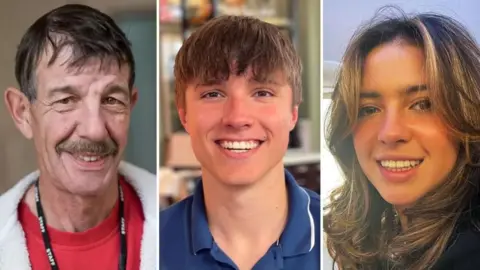 Supplied
SuppliedOn 9 April 2023, Easom-Cooper stabbed a worshipper who was leaving an Easter Sunday service at St Stephen’s Church in Sneinton.
The BBC has spoken to his victim, a man in his 40s, who survived. He did not wish to be interviewed.
Easom-Cooper’s mother, Shelly Easom, said that as a teenager, her son was under the care of child and adolescent mental health services (CAMHS) in Nottingham.
“I started to routinely go into his room and I would find knives… I found an axe, my kitchen knives would quite often be in his room,” she said.
Shelly said she would take photos of the weapons, and inform police and mental health services whenever she came across them.
 Family handout
Family handoutAccording to Shelly, things massively deteriorated when Easom-Cooper turned 18.
During the grips of a psychotic episode, he left Highbury Hospital – where he was due to be sectioned – to kill a friend before he was stopped.
In July 2022, he was sectioned by the hospital – run by Nottinghamshire Healthcare NHS Foundation Trust – for three months, but Shelly says she told staff he was not ready to be discharged.
“He was not OK when he was released,” she said. “There was no way he was going to take his medication and I told them that… it was literally just a time bomb waiting to happen.”
Easom-Cooper was placed in accommodation managed by a housing association, but Shelly said he was “unravelling” in the seven months he was there, and not taking his medication while under the care of the trust’s community team.
Shelly remembers her shock and frustration when she learned about her son’s knife attack.
“I just bloody knew this was going to happen,” she said.
“I’m so sorry it happened. I really am. And as a mother, he’s my son and he did that and that makes me feel quite ashamed.”
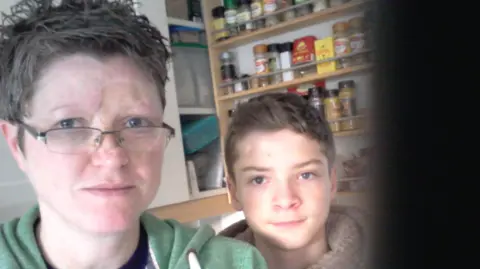 Family handout
Family handoutShe said the stabbing could have been prevented if her son’s paranoid schizophrenia had been taken more seriously.
“It’s disgusting that it takes someone to either lose their life or be stabbed before somebody thinks ‘oh, hang on a minute, maybe we need to do something here’.
“The mental health services in Nottingham have routinely and systematically let him down and also the victim,” she added.
Easom-Cooper was sentenced to a hospital order in December 2023.
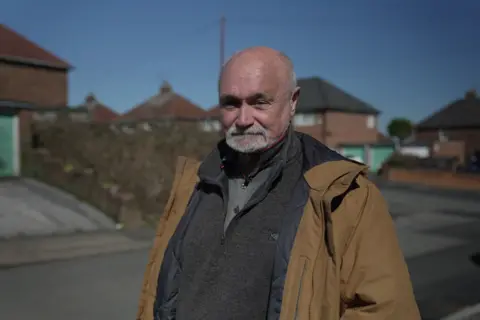 Rachel Price/BBC
Rachel Price/BBCNine weeks before Easom-Cooper’s attack, Junior Dietlin stabbed five “complete strangers” over a weekend in Nottingham and Mansfield in February 2023.
In what a prosecutor described as “a most odd and extraordinary case”, Dietlin stabbed five men once in the right bicep and then ran away in separate attacks.
One of the men stabbed was former police officer Keith Grafton, who was walking home from a pub in Mansfield.
“Suddenly, [there was] a quick thump on my right arm… I know I’ve been stabbed straight away because I felt the knife going into my skin,” the 71-year-old said.
Keith says his attacker then ran off before he could “get anywhere near him”.
He said although the attack had not left any lasting injuries, he was now “very wary” about going out late at night.
Dietlin was sentenced to a hospital order, but Keith says he was “disappointed” Dietlin had not received a prison sentence.
 Nottinghamshire Police
Nottinghamshire PoliceThe BBC has seen a report conducted by the trust into its contact with Dietlin.
It said during a four-week stay at Highbury Hospital in June 2022, Dietlin had been involved in violent incidents with staff and diagnosed with paranoid schizophrenia.
The report said his family “could not express the wish that he remain in hospital a while longer”.
It added that, after his discharge, he had taken his medication “very irregularly”.
The family, the report added, “felt they were in a good position to observe subtle changes” in Dietlin’s behaviour “that indicated he was unwell”, but when community staff visited, they concluded there were “no signs of psychosis”.
Dietlin stabbed his first victim on 8 February 2023, and the report said he had been visited by staff for a medication drop the next day.
On 11 and 12 February, he stabbed four more people.
Two weeks afterwards, the trust conducted an “initial management review”, from which they “did not identify any learning”, according to the report.
In a statement, the trust said these reviews were “completed straight away to establish if there is any immediate learning while the full investigation is being completed”.
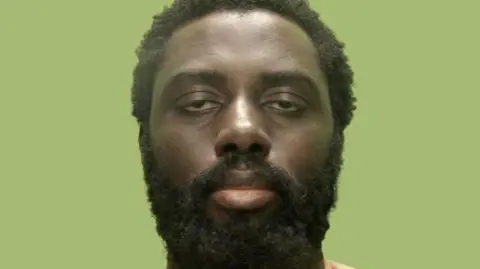 Nottinghamshire Police
Nottinghamshire PoliceEarlier this year, a review commissioned by NHS England into Calocane’s care found major failings by the trust.
Dietlin’s incident was highlighted among 15 in that report of patients “either under the current care of the trust or who had been discharged from the trust, perpetrating serious violence towards members of the community” between 2019 and 2023.
The independent review concluded the trust had an “absence of a robust approach to risk management”.
Mr Grafton said he had not known Dietlin’s history of mental health issues, nor that he had been previously sectioned.
He believes the decision to discharge his attacker into the community was “a big failing” by the trust, whom he blames for what happened to him.
“If they’d done their job properly, then it wouldn’t have happened,” he added.
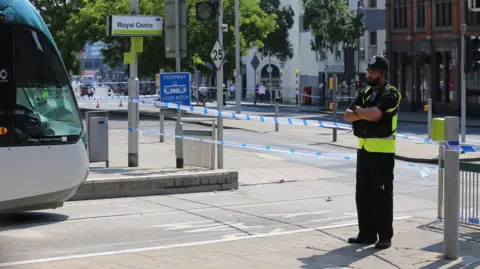 PA Media
PA MediaNottingham was brought to a standstill on 13 June 2023 in the wake of the attacks carried out by Calocane, who was sentenced to a hospital order in January 2024.
He had been sectioned four times in under two years before his attacks, but was discharged by the trust because he had “disengaged” from its community mental health team in September 2022.
It meant there was no contact between Calocane and mental health services, or his GP, for about nine months before the killings.
Details of Calocane’s medical records were revealed in a BBC Panorama documentary and the NHS-commissioned report, which also stated that “the system got it wrong” with the triple killer.
Shelly said she felt the missed opportunities in Calocane’s care mirrored her son’s experience.
She added: “When I became aware of the facts, I thought that could have so easily have been Josef… I just remember thinking ‘you know what? I’m glad he’s in hospital’.
“Those poor people had their lives cut short in such hideous ways for no reason, just because we’re not putting proper time and effort into making sure that people are well enough to walk the streets.”
Marjorie Wallace, chief executive of mental health charity Sane, said the BBC’s findings show that had the trust learned lessons from Dietlin and Easom-Cooper, then Calocane’s killings could have been prevented.
“Their failings were failure to listen to the families, failure to watch the person… and the failures to protect both the patient and then the public by discharging them far too early when they are too ill,” she said.
‘Apologise to those affected’
Neil Hudgell, a solicitor representing the families of Calocane’s victims, said the BBC’s findings showed “that very little ever resonates as it should with mental health trusts, and potentially had they learned effectively enough over the years, the events of 13 June 2023 would not have happened”.
“The families continue to rage at the incredibly sad and needless loss of the lives of their much-missed loved ones,” he added.
In a statement, Dr Sue Elcock, deputy chief executive and executive medical director at the NHS trust, said: “I want to reassure people that following any serious incident, we carry out an investigation in order to identify any areas for learning and improvement.
“We apologise to those affected for any aspects of our care that were not of the high standard our patients deserve.”
The statement added the trust had “a more robust patient discharge policy and a sharper focus on assessing and managing any risks patients may pose to others”.
Dr Elcock added: “We have made significant changes to improve family engagement, and the involvement of patients and their families and our family liaison team is included in all considerations.”
On Thursday, the government confirmed the public inquiry into the attacks was under way, and would report back within two years with recommendations to prevent similar incidents.

Get our flagship newsletter with all the headlines you need to start the day. Sign up here.


